
Nigeria: From Critic to Commander-in-Chief, Tinubu’s 2 Years in Office Contrasts His Fiery Past Tweets on Insecurity
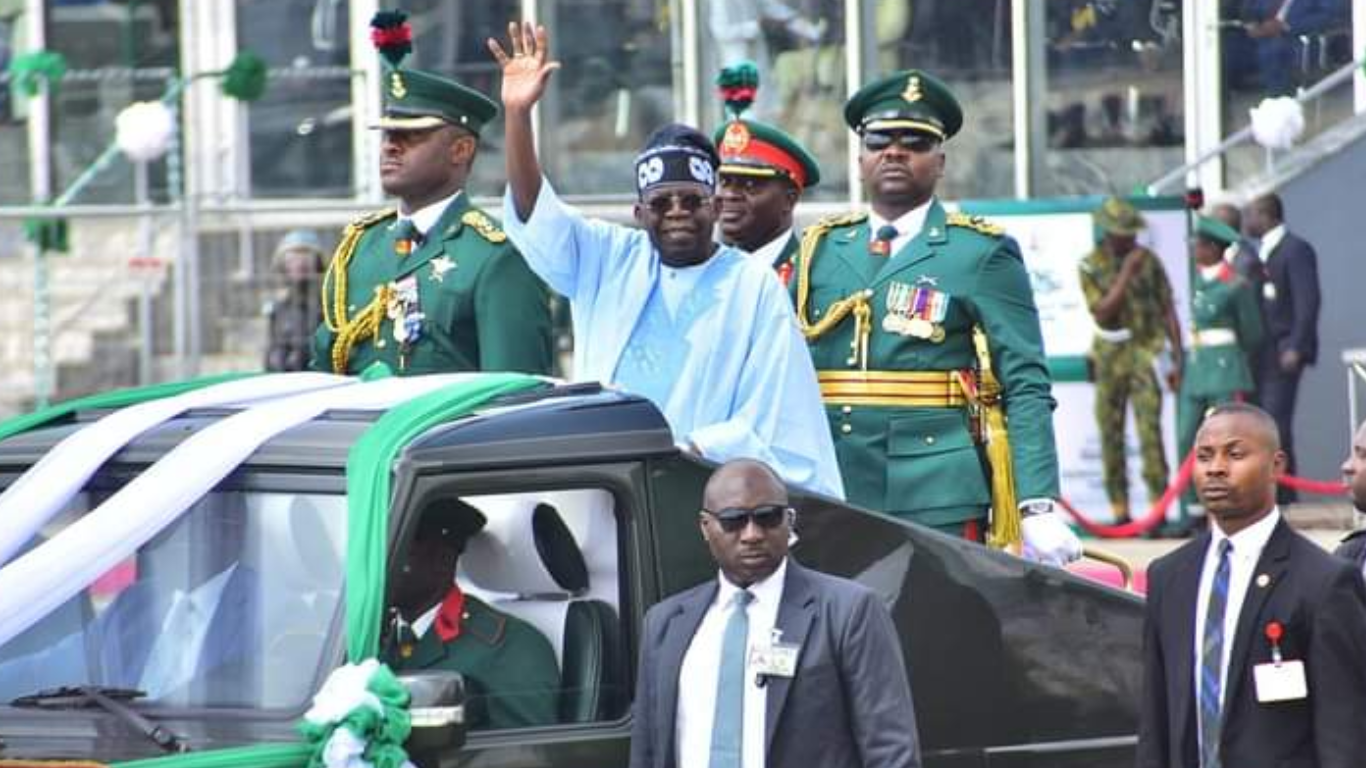
In the years before his presidency, Bola Tinubu was vocal about the threat of Boko Haram and the failure of the Nigerian government to address rising insecurity. From 2014 through 2017, he made several posts on the country’s deteriorating security. He tweeted about the carnage in the Northeast, condemning the Jonathan administration for its inability to protect citizens.
On matters of security, the bulk stops at the President’s table,” he said in April 2014. He did not mince words when he declared in September of the same year, “The festering Boko Haram attacks… is concrete proof that Nigeria has no government.”
Yet two years into his presidency, Tinubu faces a growing credibility crisis as terror once again surges across the northeastern region and other regions of Nigeria. On March 25, 2025, Boko Haram and ISWAP militants overran the Forward Operating Base (FOB) in Wajiroko, Borno State, a base critical to Operation Hadin Kai and Operation Desert Sanity IV. The attack killed three soldiers and injured many, including a brigadier general.
Despite having the advantage of a military presence and counterinsurgency infrastructure, troops were overwhelmed and forced to flee. Drone footage showed soldiers retreating in disarray, a harrowing image for a nation that had, only days earlier, celebrated supposed “victories” against insurgency.
The government’s failure to recapture the base and the continued silence from Aso Rock have drawn criticism. Nigerians question why Borno, a region under active terrorist siege, has not been considered worthy of a state of emergency, unlike Rivers State, where a political crisis prompted swift federal intervention.
This is not an isolated case. On January 25, 2025, a similar attack on an army base in Malam-Fatori claimed the lives of at least 20 soldiers. In June 2024, Justice Haruna Mshelia of the Borno State High Court was abducted by suspected Boko Haram members, along with his wife, driver, and police escort. Nearly a year later, there’s been no visible rescue operation, no concrete updates, and no public outcry from the administration.
While Tinubu’s government was swift to declare a state of emergency in Rivers following political unrest involving Governor Siminalayi Fubara and FCT Minister Nyesom Wike, in Borno, where bloodshed continues, the government has remained conspicuously inactive.
Tinubu once warned that Boko Haram could “devour more people” if the Jonathan administration remained in power. But under his leadership, the same cycle of bloodshed and government inertia continues. The optics are damning: a government quick to suppress protesters and journalists but slow to respond to military defeats and civilian kidnappings.
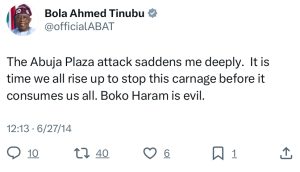
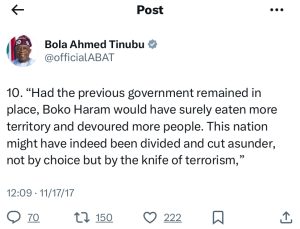
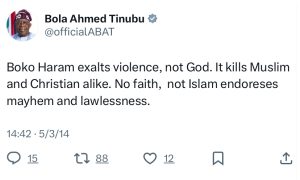
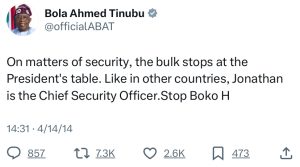
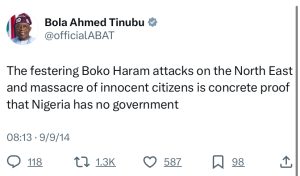
Tinubu’s past tweets are a reminder of the promises made and the expectations raised. The same man who once insisted the president bears ultimate responsibility for the nation’s security now presides over a worsening security crisis.
Recently, Borno State Governor, Babagana Zulum, said some Nigerian politicians and members of the armed forces are acting as informants and collaborators for Boko Haram insurgents. The governor also warned that the Nigerian army is increasingly under-equipped to deal with the insurgency, especially as terrorists adopt advanced technologies like drones.
He called on Tinubu to cut through bureaucratic red tape and urgently approve military procurement based on the army’s operational needs.
A few days ago, I visited the Chief of Army Staff. He said he is looking for about 32 drones and he would end the insurgency. My plea is that let us deal with this matter decisively. The president of Nigeria should listen to those that can distinguish between the right and wrong, not sycophants,” he added.
Read More:
- “No Light, No Fuel, No Hope”: Tinubu’s Two Years Leaves Nigerians in Crisis
- LOAN: Nigeria Must Not Be Sold into Debt Slavery – Atiku Tells Tinubu
About The Author
Related Articles
Tinubu Government Delays Release of Signed Tax Acts to the Public
Four days after President Bola Tinubu announced the signing of four tax...
ByMayowa DurosinmiJune 30, 2025As Tinubu Urges Africa-Caribbean Unity in Saint Lucia, Over 272 Nigerians Killed in June Alone
While Nigerians deal with deadly violence, worsening hunger, and mass flooding, President...
ByWest Africa WeeklyJune 30, 2025You Can’t Tax a Dead Economy: Nigeria Is Suffocating Under Its Own Policies
As Nigeria’s Central Bank clings to its benchmark interest rate of 27.5...
ByWest Africa WeeklyJune 30, 2025“Wike is Not a Blessing to Us, He’s a Disaster” — Workers Protest in Nigeria’s Capital Over Unpaid Wages, Poor Working Conditions
Staff members of the Federal Capital Territory Administration (FCTA) in Abuja barricaded...
ByOluwasegun SanusiJune 30, 2025












Leave a comment